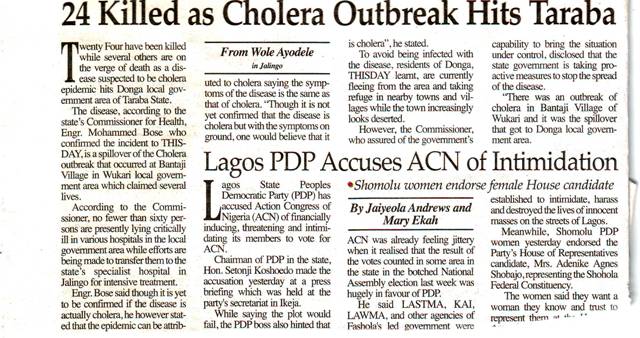We have blogged a lot about outbreaks in Nigeria, and the apathy of our government in responding to them. We have stated our worries about the impact of these on the people, and the ineptitude of the various “taskforces” often set up by government in response. We have on several occasions called for the identification, and collection of the requisite expertise into a National Centre for Disease Control. We know that the promise to do this has been made by several previous Ministers of Health. The last such promise was made in November last year when the Vice President, Namadi Sambo “directed” the Federal Ministry of Health to collaborate with the office of the special assistant to the president on Millennium Development Goal MDGs to establish a Center for Disease Control (CDC), in Nigeria. Nigerians have grown used to taking these public proclamations made during the hundreds of public appearances by our leaders with a pinch of salt, we hope that this will be different this time.
Recently, Médecins Sans Frontières (MSF) recieved an international award for its response to the lead poisoning incident that began in northern Nigeria in March 2010, and is still ongoing. MSF is reported to be treating more than 1,000 children for lead poisoning in several villages in Zamfara state. It is one of the most serious cases of acute heavy metal poisoning ever recorded. Why does MSF have to treat Nigerian children for lead poisoning since March 2010? Where are the instruments of the Nigerian State, that should be doing this?
Even here at Nigeria Health Watch, we have fallen prey to the apathy we complain about. Reading the newspapers during the election period in Nigeria, we were so engrossed in the intrigues of our emerging democracy and the violence that came with it that we hardly noticed these headlines until it was drawn to our attention by some of our readers.
I would often argue vehemently for our government to make progress with our power sector. The reason for this is two-fold. Firstly, due to the inherent benefits of an efficient power supply to the country, but secondly so we can find some time for the other challenges facing our country. It is our opinion that our democratic governments in the past 12 years have simply not prioritised the health sector, and neither have the population put pressure on our government in this regard.
The time has come for this to change, and maybe a more proactivce and strategic response to these outbreaks would be a good place to start. We simply cannot accept a situation where Nigerians are dying of such diseases as Cholera and Measles in 2011. These are disease that are technically easy to prevent and easy to control with basic tools. But it will take political will, and an appreciation of the complexity of the issues at stake to make progress in this regard. Several partners have offered their assistance in this regard, but we must now show the courage it takes to set up a disease control center to bring the expertise, equipment and resources needed together into a National Centre for Disease Control in Nigeria.
Never doubt that a small group of thoughtful committed people can change the world; indeed it is the only thing that ever has…Margaret Mead




